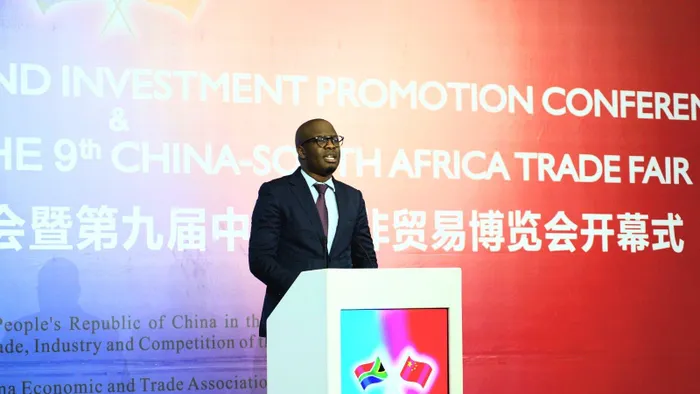
Zuko Godlimpi, Deputy Minister of Trade, Industry and Competition, speaking at the South Africa–China Trade and Investment Promotion Conference in Johannesburg on Tuesday.
Image: Supplied
China has signaled its readiness to fast-track zero-tariff access for South African goods, opening the door for more local products to enter its vast consumer market under favorable terms.
Speaking at the South Africa–China Trade and Investment Promotion Conference in Johannesburg on Tuesday, Chinese Ambassador to South Africa Wu Peng said the initiative forms part of Beijing’s broader commitment to deepen economic cooperation with Africa.
“In June this year, President Xi Jinping announced that China is ready to expand zero-tariff treatment for 100% of tariff lines to all 53 African countries that have diplomatic relations with China,” Wu said.
“More than 30 African countries have already signed the framework agreements. China is prepared to work with South Africa to implement these measures as soon as possible.”
The announcement comes as South Africa continues to negotiate a trade deal with the United States, following Washington’s unilateral decision under former President Donald Trump to impose 30% tariffs on South African imports.
Wu highlighted that South Africa’s recently unveiled 2025–2029 Trade, Investment and Industrialization Plan—which identifies 100 priority products for export promotion to China—aligns closely with Beijing’s support for African industrialisation and export diversification.
China is already a key market for South African agricultural products. Avocados and dairy have gained entry in recent years, while 68 categories of agri-food products now enjoy access. Notably, 90% of South Africa’s pecans and half of its macadamias are sold to China.
South Africa has also become a leading destination for Chinese investment in Africa.
More than 200 Chinese companies have invested over $11 billion in sectors including new energy, automobile manufacturing, the digital economy, mineral processing, and agro-processing—creating more than 400 000 local jobs.
Wu urged Chinese automakers to accelerate plans to establish manufacturing plants in South Africa.
Jinhua, one of China’s most dynamic trading hubs, also pledged to deepen commercial and cultural ties with South Africa as part of efforts to expand China–Africa cooperation.
Mayor Zhang Jian said Jinhua had maintained trade links with every African country, with exports to Africa accounting for nearly one-tenth of China’s total over the past decade.
The city also organizes the annual China–Africa Economic, Trade and Cultural Cooperation Forum, now part of the Forum on China–Africa Cooperation (FOCAC). For this year’s expo, Jinhua brought 64 companies to Johannesburg, both as exhibitors and buyers.
“We want to recommend more quality products to Africa while also purchasing more African goods for the Chinese market,” Zhang said, pledging to share the opportunities of China’s vast consumer base with African businesses.
He invited South African partners to attend the 2025 China–Africa Economic, Trade and Cultural Forum scheduled for November in Jinhua, which he said would further consolidate trade and cultural exchanges.
“With joint efforts and practical cooperation, we will surely reap fruitful results,” Zhang said.
Zuko Godlimpi, Deputy Minister of Trade, Industry and Competition, welcomed the deepening relationship, noting that Chinese companies such as BAIC, BYD, Chery, Huawei, Hisense, and ZTE have become significant players in South Africa’s economy.
“We have seen Chinese firms expanding into renewable energy, green hydrogen, energy storage, logistics, and the digital economy,” Godlimpi said.
“The renewed focus on balancing the trade relationship, attracting investment in manufacturing, and leveraging the African Continental Free Trade Area will be vital for building a more equitable and mutually beneficial future.”
According to fDi Markets data, Chinese investment in South Africa between 2003 and 2025 has surpassed $13.1bn, while South African investment into China reached $7.8bn over the same period.
With both governments prioritizing industrialisation and green growth, the Johannesburg conference underscored a growing shift: South Africa and China are not only trading partners, but also strategic collaborators shaping new frontiers in renewable energy, advanced manufacturing, and digital innovation.
BUSINESS REPORT